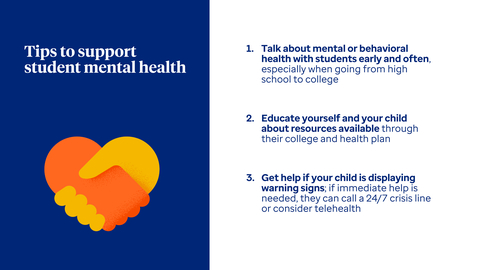New Survey Finds College Students Nearly 50% More Likely Than High Schoolers to Self-Report High-Risk Mental or Behavioral Health Concerns – and Parents May Not Know
UnitedHealthcare's second annual Student Behavioral Health Report reveals that college students are nearly 50% more likely than high schoolers to self-report high-risk mental or behavioral health concerns. The survey shows that 77% of college students reported experiencing issues like anxiety/stress (55%), depression (41%), and suicidal ideation (13%) in the past year. In contrast, high school students reported lower incidences at 35%, 20%, and 9%, respectively.
Additionally, there is a significant perception gap between what parents believe and what college students experience, while high school parents align more closely with their children's reports. The report emphasizes the importance of frequent conversations between parents and students to improve mental health outcomes.
UnitedHealthcare provides various behavioral health solutions, including digital tools, telephonic support, and virtual visits, to assist individuals in accessing the right care at the right time.
- UnitedHealthcare's report highlights an urgent priority in youth mental health, raising awareness among parents and educational institutions.
- 77% of college students self-reporting mental health concerns indicates a high level of awareness, which may lead to increased utilization of mental health services.
- The report promotes more frequent and effective conversations between parents and students, which could improve mental health outcomes.
- UnitedHealthcare offers a comprehensive range of behavioral health solutions, increasing accessibility to mental health support.
- College students showing a near-50% increase in high-risk mental health concerns compared to high school students is alarming.
- Parent perceptions not changing from high school to college suggests a significant communication gap, potentially exacerbating mental health issues.
- The high rates of anxiety (55%), depression (41%), and suicidal ideation (13%) among college students indicate severe mental health challenges that require urgent attention.
- The perception gap between parents and college students could lead to inadequate support and misunderstanding of students' mental health needs.
The data reveal high school and college students self-report similar mental and behavioral health concerns, but at significantly different rates
Data suggest more frequent conversations between students and parents may impact outcomes
UnitedHealthcare today announced new survey findings from its second annual Student Behavioral Health Report, revealing college students are more likely to self-report they or a roommate/friend encountered high-risk mental or behavioral health concerns in the past year compared to high school students.

Tips to Support Student Mental Health. UnitedHealthcare Student Behavioral Health Report. (Graphic: Business Wire)
Findings further show a significant gap remains between what college students self-report and what parents of college students perceive. In contrast, parents of high schoolers report perceptions closely aligned with the experiences high school students self-report.
Data reveal among college students,
The Student Behavioral Health Report also reveals additional insights, including:
- An association between more frequent discussions of students’ mental or behavioral health and significant increases in students self-reporting feeling “supported.”
- Trends in the influencing factors that may surround students’ mental and behavioral health across high school and college years.
- Key differences in the way parents understand challenges facing high school vs. college students.
“Youth mental and behavioral health remains an urgent priority. The challenges students experience increase dramatically during college and parents may not realize it,” said Dr. Donald Tavakoli, national medical director for behavioral health, UnitedHealthcare. “Recognizing the potential gaps between parent perceptions and student experiences, especially in the transition from high school to college, can help parents stay connected and supportive.”
"Conversations about emotional health, whether peer-to-peer or intergenerational, can be uncomfortable or difficult to navigate,” said John MacPhee, CEO of The Jed Foundation (JED). “These new data from UnitedHealthcare underscore the importance of frequent discussions between parents and their children, which can make a substantial difference in a young person's life, empowering them to seek support."
To help parents talk to their kids about mental well-being and spark conversations that move past one-word answers, UnitedHealthcare offers parent and youth conversation starter cards.
For those seeking support, UnitedHealthcare helps guide people to the right care at the right time across a broad range of behavioral health solutions. This includes digital self-care tools, telephonic emotional support, coaching, in-person and virtual visits, family support, employee assistance programs and more, allowing individuals to access support in a variety of ways.
For more information about behavioral health resources, visit UHC.com and UnitedHealthcare Student Resources. To explore additional data, insights and trends, access the full report here.
About the Student Behavioral Health Survey and Report
Commissioned by UnitedHealthcare and conducted by YouGov, “The Student Behavioral Health Report” surveyed a total sample of 2,058 Americans, of whom 526 are
* The term “thoughts of self-harm” was used for high school students vs. “suicidal ideation and intent” for college students. |
About UnitedHealthcare
UnitedHealthcare is dedicated to helping people live healthier lives and making the health system work better for everyone by simplifying the health care experience, meeting consumer health and wellness needs, and sustaining trusted relationships with care providers. In
View source version on businesswire.com: https://www.businesswire.com/news/home/20240516260578/en/
Will Holman
952-931-5926
william_s_holman@uhc.com
Source: UnitedHealthcare







